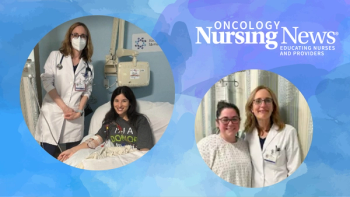
Patient Perspective: Diagnosis of Multiple Myeloma
Panelists discuss the emotional and diagnostic journey of a multiple myeloma patient and his care partner, highlighting how incidental back pain led to an unexpected cancer diagnosis, the initial shock and fear that followed, and the pivotal role of expert care, accurate information, and community support in finding hope and navigating the disease.
Episodes in this series

The panel discussion continued with a patient sharing their personal experience of being diagnosed with multiple myeloma. Initially, the individual was in good health, experiencing only moderate back pain, which was treated periodically with epidural injections. It wasn’t until an MRI was ordered that lesions along the spine and a tumor on the hip were discovered, leading to a cancer diagnosis. This unexpected finding, without classic symptoms like fatigue or abnormal bloodwork, illustrates the often-subtle early presentation of multiple myeloma and how it can be diagnosed through incidental findings during unrelated evaluations.
The patient’s care partner recalled the emotional shock of receiving the diagnosis right after the holidays. Expecting a routine appointment, the diagnosis came as a devastating surprise. With family visiting and little time to process, the couple was suddenly faced with a life-altering situation. They quickly turned to trusted sources for information and support, such as patient foundations and online communities specific to myeloma. These resources not only offered guidance but also emphasized the importance of being treated by specialists familiar with this rare and complex disease.
Both the patient and care partner described the emotional turmoil that follows a cancer diagnosis—fear, panic, and questions about the future dominated their initial thoughts. The internet often provided alarming statistics and worst-case scenarios, contributing to their anxiety. However, connecting with experienced professionals and credible myeloma-specific organizations helped shift their outlook from fear to cautious optimism. Their story underscores how vital early expert involvement and accurate information are in guiding patients from initial diagnosis toward a hopeful, informed, and proactive approach to care.
Newsletter
Knowledge is power. Don’t miss the most recent breakthroughs in cancer care.



































